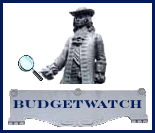- Home
- About
- News
- Tax Reform
- Ethics Reform
- Budget Reform
- Reformer’s Roundtable
- Contact Us







I Guess It Is On To Plan B
 Five long years — that is supposed to be the length of time covered by the plan crafted by the city administration to guide Philadelphia's finances into the future. Five short weeks — that is about the length of time that the assumptions in the city’s Five-Year Financial Plan remained valid after it was adopted in July. The Plan didn't last even two months. I guess we must be on to plan B now.
Five long years — that is supposed to be the length of time covered by the plan crafted by the city administration to guide Philadelphia's finances into the future. Five short weeks — that is about the length of time that the assumptions in the city’s Five-Year Financial Plan remained valid after it was adopted in July. The Plan didn't last even two months. I guess we must be on to plan B now.
After the city flirted with bankruptcy in the early 1990s, a state-appointed financial oversight board was established to review city budgets and the city was compelled to prepare a Five-Year Financial Plan to show that the budget would not just balance for the next year, but for the next five years. Given the seriousness of its purpose, the Five-Year Plan, which details how the city plans to raise and spend nearly $19 billion in the coming years, should represent the most honest and comprehensive view of the city's fiscal future. But, today, the Five-Year Plan too often includes serious omissions and dubious assumptions that call into question the Plan's usefulness.
As detailed by recent media accounts, tax collections exceeded the city administration's budgeted estimates by more than $200 million. (The fact that the administration underestimates revenue collections is a yearly budgetary occurrence that has become as certain as humid Philadelphia summers). Tax revenue growth will most likely lead to higher-than-anticipated collections for the coming five years. Therefore, it is very likely that the Five-Year Plan does not account for hundreds of millions of dollars in revenues that will come in over the next five years.
On the other side of the ledger, the Five-Year Plan fails to account for hundreds of million in spending that will likely occur in the next five years. For example, the Plan fails to estimate any increased costs for raises for the city’s unionized workforce after current contracts expire in 2008. Unless the city plans to give no raises to city workers as part of the next round of contract negotiations, the Five-Year Plan does not account for hundreds of millions of dollars in increased salary and benefits costs.
It doesn’t end there. The recently announced arbitration award in favor of the union representing city fire fighters will increase expenditures by approximately $24 million beyond what is already accounted for in the Plan. After the Mayor backed off his declaration that the city would reduce the number of police by 63 officers when the state took over patrolling those highways, the Plan was left with a hole equal to the $25 million it will take to pay to keep those officers on the force. Newly announced state programs to partially fund the hiring of new police will create the need for the city to spend maybe another $30 million on local matching payments over the life of the Plan.
Furthermore, the Mayor recently announced his intention to double funding for Office of Emergency Management and establish an Office of Gambling — those additional costs are not anticipated in the Plan. Similarly, the Mayor has announced his support for a plan to create a Rainy Day Fund that will have the city place a small portion of revenues in a restricted fund, which will reduce expendable revenues in the plan by perhaps another $75 million.
The current Five-Year Plan was adopted and approved just weeks ago and while the summer has not yet ended, many assumptions contained in the Plan have already turned out to be incorrect and new developments have created the need to make additional changes. Not even three months old, and now in need of significant changes, the Plan is unlikely to be reworked.
Some say that plans are useless but planning is essential. Surely Philadelphia's Five-Year Plan would be more useful if it would account for all of the revenues and expenditures we know about — and it would certainly be more usable if we actually followed the plan for more than a few days (or altered the Plan on an ongoing basis when necessitated by changing circumstances). But, clearly, what is essential is to make our city's plan to raise and spend revenues over the next five years something that we can rely upon to chart a strategy to make Philadelphia a preferred place to live, work, and visit.
